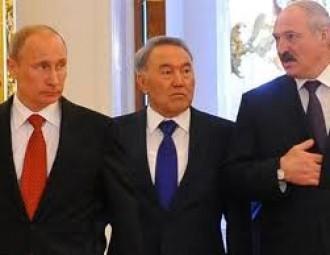Putin, Lukashenka, and Nazarbaev are considering talks with Poroshenko

The information about that comes from the press office of the president of Kazakhstan Nursultan Nazarbaev.
“Kazakh President Nursultan Nazarbaev and Russian President Vladimir Putin had discussed the Ukraine crisis over the phone as well as joint steps to organize direct talks with Ukrainian President Petro Petro Poroshenko. The talks might take place within the framework of the Customs Union’s summit or an emergency meeting of the CIS Council of Heads of State”, the press office of the president of Kazakhstan reported.
On Friday, August 8, while meeting with Gennady Zyuganov, first secretary of the Central Committee of the Communist Party of the Russian Federation, and Petro Symonenko, first secretary of the Central Committee of the Communist Party of Ukraine, Aliaksandr Lukashenka said in Minsk that the presidents of the Customs Union troika and, possibly, Ukraine, will soon have a series of meetings.
Zyuganov and Symonenko arrived in Minsk to meet with Aliaksandr Lukashenka and other Belarusian government officials and politicians to discuss the situation in Ukraine and possible cooperation to prevent the new Ukrainian government from banning the Communist Party of Ukraine, BelaPAN informs.
The meeting began at Hotel Europe on Friday morning with Ihar Karpenka, first secretary of the Central Committee of the Communist Party of Belarus, in attendance.
According to the Belarusian government’s news agency BelTA, Lukashenka noted that Ukrainian President Petro Poroshenko had not indicated any opposition to a proposal to meet with his Belarusian, Kazakh and Russian counterparts,.
Lukashenka expressed bewilderment that the southern part of “our fatherland” had descended into chaos despite what he described as the closest possible ties between Belarus, Russia and Ukraine.
“The wish of the Americans, the Europeans is clear,” Mr. Lukashenka said. “I said at the very beginning that we should beware, that there would be attempts to draw us into this slaughter like water into a funnel, to create not just a hotbed of tension but the things happening now, to start a new war. And this war will be very dangerous. However, no one paid attention then. And look what is happening.”
Addressing Messrs. Zyuganov and Symonenko, Mr. Lukashenka said that he would like to hear alternative views on the situation in Ukraine from both Moscow and Kyiv.
-
03.01
-
07.10
-
22.09
-
17.08
-
12.08
-
30.09








































